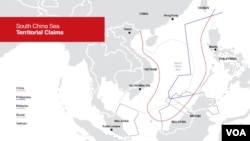China's ambassador to the United States has rebuked the U.N. arbitration court ruling that dismissed Beijing's territorial claims in the South China Sea.
Speaking Tuesday in Washington, Cui Tiankai said the ruling will "undermine and weaken the motivation of states to engage in negotiations and consultations" to resolve conflicts, and instead will "intensify conflict and even confrontation." But, he said, Beijing remains committed to negotiations with other parties in the South China Sea issue.
Tuesday's ruling by the Hague-based Permanent Court of Arbitration answers a complaint brought by the Philippines in 2013 that accused Beijing of violating the U.N. Convention on the Law of the Sea (UNCLOS) with its aggressive actions on the Scarborough Shoal, a reef located about 225 kilometers off the Philippine coast.
Cui also accused the tribunal of "professional incompetence," saying it was dealing with a sovereignty dispute, which is beyond its jurisdiction.
In Beijing earlier, Chinese President Xi Jinping rejected the ruling and said "China's territorial sovereignty and maritime interests in the South China Sea" will not be affected. China's foreign ministry said on its website, "The award is null and void and has no binding force."
The court said Beijing's claim of virtual sovereignty over nearly all the South China Sea under a so-called "nine-dash line" runs contrary to UNCLOS, which sets a country's maritime boundaries 22 kilometers from its coast, and control over economic activities up to 370 kilometers from its coast. The court ruled China had violated Manila's sovereign rights by interfering with Philippine fishing and oil exploration activities in the area.
‘Milestone decision’
In Manila, Philippine Foreign Secretary Perfecto Yasay, at a news conference moments after the ruling, called it "a milestone decision." Yasay said the ruling makes "an important contribution" to resolving the ongoing maritime disputes, and he urged all parties "to exercise restraint and sobriety." New Philippine President Rodrigo Duterte has called for bilateral negotiations to resolve the controversy.
U.S. State Department spokesman John Kirby called the ruling "an important contribution to the shared goal of a peaceful resolution to disputes in the South China Sea."
China boycotted the proceedings at the court, saying it will not accept, recognize or implement any ruling on the South China Sea, despite being a signatory to UNCLOS.
‘Breaking the law’
Analysts said the court ruling is a significant decision in favor of the Philippines.
Ernest Bower with the Washington-based Center for Strategic and International Studies said, "China now faces reality that if it continues to assert, through actions and words" its claims in the region, "it is breaking the law."
Amarjit Singh, a senior consultant at the British think tank IHS, said the ruling "undermines China's claims in the South China Sea and potentially limits China's negotiating stance" with other countries that also have asserted claims there, including Brunei, Malaysia, Taiwan and Vietnam.
State news agency Xinhua and netizens expressed strong dissatisfaction with the ruling online. A Weibo user said in his posting, "We should unite behind the country's claim and make no concessions on the South China Sea dispute even if we have to go to war."
Another user said, "China should show no fear for any future economic sanction" should it decide not to comply with the order.
An estimated $5 trillion in global trade passes each year through the South China Sea, which is home to rich fishing grounds and a potentially vast wealth of oil, gas and other natural resources.
About 100 demonstrators marched outside the Chinese consulate in Manila, calling on Beijing to relinquish the Scarborough Shoal, shouting "Chexit Now" — a play on the term coined for Britain's controversial push to leave the European Union.
No enforcement
China has launched a massive land seizure and rebuilding effort throughout the South China Sea in recent years, transforming numerous reefs into artificial islands that can support military installations, all the while ignoring competing claims over the region by Brunei, Malaysia, Vietnam and Taiwan, as well as the Philippines.
The Hague court also ruled Tuesday that none of the Spratly Islands granted China an exclusive economic zone, and that its construction activities on Mischief Reef caused "irreparable harm" to the reef's ecosystem.
Despite Tuesday's ruling, the United Nations has no mechanism to enforce the decision, either through military action or economic sanctions. But it could prompt China's other Asia-Pacific rivals to also file suit, putting increased diplomatic pressure on Beijing to reduce its presence in the South China Sea.
The United States also has challenged Beijing's increasing aggressiveness in the region, holding a number of naval exercises and deploying warships near the rebuilt reefs to assert the international freedom of navigation rules.
Smita Nordwall, William Gallo, Richard Green, Saibal Dasqupta, Joyce Huang and Teng Xu of VOA's Mandarin Service contributed to this report.








